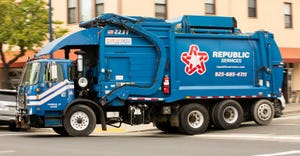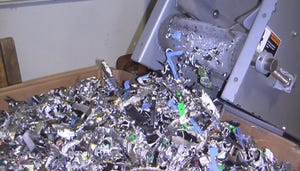BUSINESS MANAGEMENT: Been There, Done That: Learning From Others' Environmental Successes
September 1, 1999
Marna Louis
What if you have a good recycling and waste reduction program, but might be able to cut your disposal costs or provide better service? Enjoy the advantages of trial without error through Washington, D.C.-based Renew America's "Environmental Success Index." This resource allows waste industry professionals, nonprofit organizations and community groups seeking to improve their operations or implement new ideas to discover the elements that are most likely to succeed.
The Index - an online database of l,400 environmentally beneficial programs from around the country with effective solutions to community environmental and waste management concerns - features more than 300 solid waste and hazardous waste reduction, recycling and pollution prevention programs.
For example, the city of Los Angeles Board of Public Works L.A. Resource Program met the challenge of managing 7 pounds of trash per person per day in a city of 3.5 million people spread out over 450 square miles. Boasting the largest curbside recycling program in the country, its success is attributed to combining automated trash collection and commingled recycling, which has made disposal convenient, clean and easy for residents.
As a result of Los Angeles' waste management strategies, between 4,000 and 5,000 tons of recyclables per month are diverted and redirected to facilities for recovery. This has strengthened Los Angeles' recycling markets, improved working conditions for sanitation workers, boosted the quality of life for all municipal residents, and spawned training and employment for inner-city youth.
Another success story included in the Index is McDonnell & Miller's ESH Impact Program. A Chicago-based industrial controls manufacturer and division of ITT Industries, McDonnell & Miller reduced its annual facility water consumption by more than 1 million gallons and decreased its mercury switch installations by 58 percent. Unlike most companies that would leave the Chicago industrial area instead of improving its operations, McDonnell & Miller voluntarily chose to integrate environmental issues into its day-to-day operations and became the first Illinois company to be ISO 140001 standard certified. In doing this, McDonnell & Miller decreased its electricity use by 10.6 percent, or 353,755 kilowatt hours in 1998. The same year, it also decreased its off-site oil and water waste disposal by 92 percent - saving the company $9,748.
U.S. West Dex's Outdated Telephone Directory Recycling Program also illustrates how a "closed loop" recycling program can take a bite out of the solid waste stream, according to the Index. Every year, the regional phone company collects hundreds of thousands of used phone books at drop-off sites located in 14 states and recycles them into paper for the following year's directories. Since 1990, Dex has recycled more than 3 million used directories, saving 1.5 million trees and 610 million gallons of water that normally would have been used to print new telephone books.
To expand the program's success even further, Dex has introduced a school recycling program featuring a guidebook that teaches students about recycling's benefits. As a result of what the students learned in the guidebook, one school collected more than 205 tons of old books - a 150 percent improvement over what it had collected for recycling in the previous year.
The Index, which includes 26 categories including air quality, energy efficiency and wildlife protection programs, used four criteria in its evaluations:
* Program effectiveness;
* Natural resource conservation;
* Economic progress; and
* Human development.
Programs also must pass a three-stage review process consisting of reference checks and evaluations from independent local organizations; veri- fication of program results by participating nonprofit, state-level organizations; and review by the National Awards Council for Environmental Sustainability (NACES), a coalition of national environmental, nonprofit, government and business organizations that includes the National Audubon Society, Sierra Club and AT&T.
The Index is free and can be searched by topic or geographic region. Each listing provides a brief program description and information on how to contact the sponsoring organization. E-mail and website links are provided when available. For more information, call (202) 721-1545. The Index can be viewed at: www.crest.org/renew_america
You May Also Like


